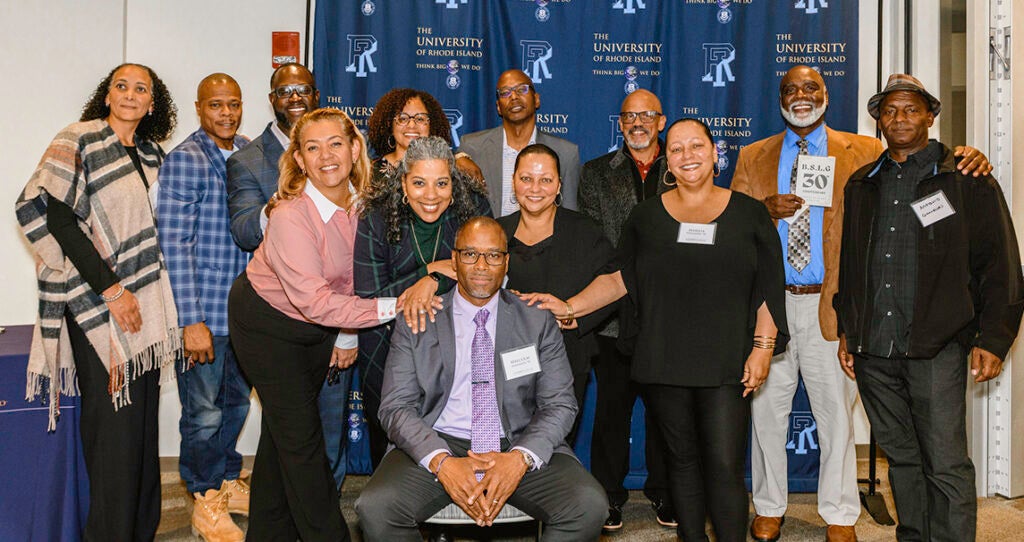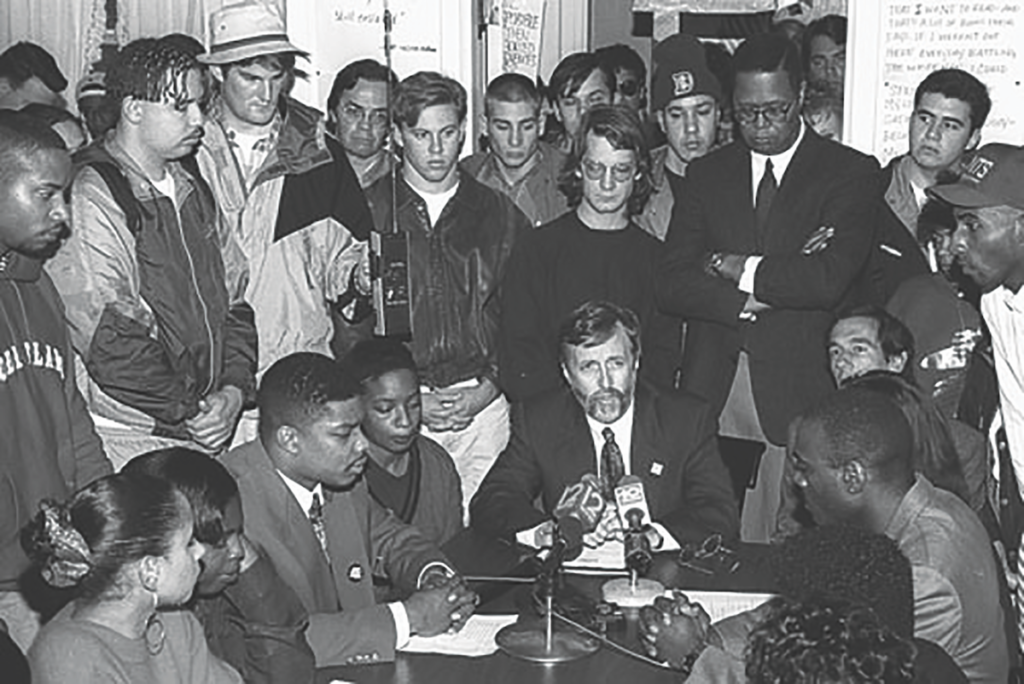KINGSTON, R.I. – Nov. 21, 2022 – Malcolm Anderson was a 22-year-old University of Rhode Island student on Nov. 10, 1992, and he was worried and overwhelmed. The Black Student Leadership Group had asked him to be its spokesperson before a planned takeover of Taft Hall that day.
“I didn’t ask for this, but when I was asked to do it, I had to get over being an introvert,” said Anderson, now assistant principal at Long Reach High School in Columbia, Maryland.
“I was afraid because I was thinking ‘what the heck is a spokesperson?,’” he said. “When you see a (reporter’s microphone) in your face and then five more, and you have no practical training, you can’t look like a punk, you can’t look like you are weak. You have to always be strong.”
And he knew that he also needed to lift up the group in the glare of intense media attention.

But, 30 years later, the reluctant spokesperson gave a stirring, sometimes tearful, and occasionally humorous speech as he and his fellow alumni of the Black Student Leadership Group joined current students, faculty, and staff at URI to commemorate the organization’s takeover of Taft Hall. See a video of the event and an accompanying documentary.

Anderson’s talk on Nov. 10 was part of a full slate of activities to commemorate the significant moment in the University’s history, which started with a reflection at Taft Hall, home of Talent Development, a reception at the Multicultural Student Services Center, which was built as a result of the takeover and opened in 1998, and a dinner and speaking program at the Higgins Welcome Center.
The peaceful yet powerful protest was sparked by a truncated Malcolm X quote, engraved near the entrance to the Robert L. Carothers Library and Learning Commons, and various injustices experienced at the University by BSLG members and their supporters.
The inscribed quote reads, “My alma mater was books, a good library … I could spend the rest of my life reading, just satisfying my curiosity.” The full quote reads, “I told the Englishmen that my alma mater was books, a good library. Every time I catch a plane, I have with me a book that I want to read. And that’s a lot of books. If I weren’t out there every day battling the white man, I could spend the rest of my life reading, just satisfying my curiosity.”
While the incomplete quotation is still there, URI President Marc Parlange assured the audience that it will soon be removed.
“Tonight, it is very important we acknowledge that 30 years ago there was a group of students who stood up and had the courage to address injustices that were happening at the time,” Parlange said. “I am happy to share with you that work on removing the etching on the library will be completed by the end of the year.”
Parlange acknowledged the efforts of members of the University community, including URI alumna Michelle Fontes, interim vice president for community, equity, and diversity.
“It has been a pleasure to work with Michelle, an original member of the BSLG, who has been working on an alternative installation for the library,” Parlange said.
Honoring the past, looking to the future
During the commemoration, URI students Bintou Keita and Markeem Rodrigues presented plaques to the families of two late BSLG members, Toney DaMoura and Earl N. Smith III, assistant dean of the College of Arts and Sciences, who died earlier this year. The plaques are inscribed: “In honor and in recognition of commitment and selfless sacrifice to the Black Student Leadership Group (BSLG). May their work never go in vain and may their legacy continue to reign. BSLG 30 Year Commemoration, 11/10/22.”
The audience also viewed a documentary film about the BSLG and the takeover by URI student Cristobal Bustos and alumnus Lanre Ajakaie, which featured historic news footage, newspaper clips and recent interviews with those involved in the protest.
In addition, students Stedman Gyamfi-Darkwah, Kiara Duarte, Jordan Severino, Shamar Morgan, Lourdes Monteiro and Brandon Grace read the original 14 demands made by the BSLG during the takeover.
According to Anderson, those 14 points were developed after hours of study, fasting and discussion among the group. The points and discussions with campus officials led to many positive outcomes, but several speakers said the work is ongoing.
Before the takeover, “we had a retreat, we left campus, and we had a knock down drag out,” said Anderson, the former BSLG spokesman. “Our big thing at the start was that we had to hold each other accountable before we held others accountable. There were things that we were doing to each other that weren’t right. We were disrespecting each other and we needed to get our stuff together before we asked anything of anyone.”
Hold yourself accountable
Anderson continued by offering an inspiring message to students.
“I say to our students, you’ve got to hold yourself accountable. When you go to class, hold yourself accountable, when you take that test that you don’t want to take, hold yourself accountable, because that assessment, that homework assignment you turn in could mean the difference in getting a scholarship,” Anderson said. “That could make the difference if you are that person that actually lifts your family out of the situation they are in.”
He told the URI students that they belong at URI; they should be confident and let nothing get in their way.
“Because the enemy wants you to stop, to fail. If you fail out and go home, oh yes, they are clapping, saying oh yes, but the BSLG says keep running, because your ancestors did. They went through many more difficult challenges than we had to.”
Master of ceremonies Bobby Britto-Oliveira, assistant director of the Multicultural Student Services Center and co-chair of the Alumni of Color Network, told the audience that the reason for the event was the BSLG and its commitment to a peaceful but powerful action 30 years ago.
The event was designed to: commemorate the BSLG takeover, to hold the University accountable 30 years later and to assess what has been done since that time and for the current Talent Development Scholars and beneficiaries of the movement to learn what took place and implement those lessons in their own journeys to make URI a better place.
“Learn from their struggle, their sacrifice,” Britto-Oliveira said. “This work isn’t for the weak. It’s a torch, and the next generation and my peers are now carrying that torch. But we wouldn’t be carrying that torch if it weren’t for those students in 1992. We are going to continue that fight.”
Deployed for justice
Sara Monteiro, a 2008 graduate of URI and co-chair of the Alumni of Color Network, also offered powerful messages to the group.
“There are some people who are driven by money, titles. And we don’t come from that. Some are just hound dogs for justice; we were born into service,” Monteiro said. “You don’t have to be deployed to be of service. Thirty years ago, we saw the first infantry deployed at URI in the name of justice. These were students seeking to create a reality most people could not envision. You all were visionaries, seeing things that weren’t even before you, that weren’t even promised to you.”
The BSLG reflected the sacrifices of African Americans who came before the group existed, she said. As a member of a family that came from Cape Verde, she said that the struggles for racial justice in America mirrored the experiences of the injustices wrought by colonialism in other countries.
“It’s mental warfare and it’s detrimental to the spirit to escape one form of oppression to wind up in another,” she said.
Monteiro said members of the BSLG signed up to “serve and protect. They sacrificed for our rights so I could give my talk. Their sufferings were not in vain. They birthed the Africana Studies program and Bobby (Britto-Oliveira) gets to work in the Multicultural Center because of their work.”
On a recent December day, Monteiro and her son arrived at the Alumni Center for an Alumni of Color Network event. Event staff handed them a gift bag.
“My son says, ‘I know what’s in that bag, my scholarship to URI.’ The boy is 9 years old, but all of this becomes a powerful demonstration that we belong and we do.”

